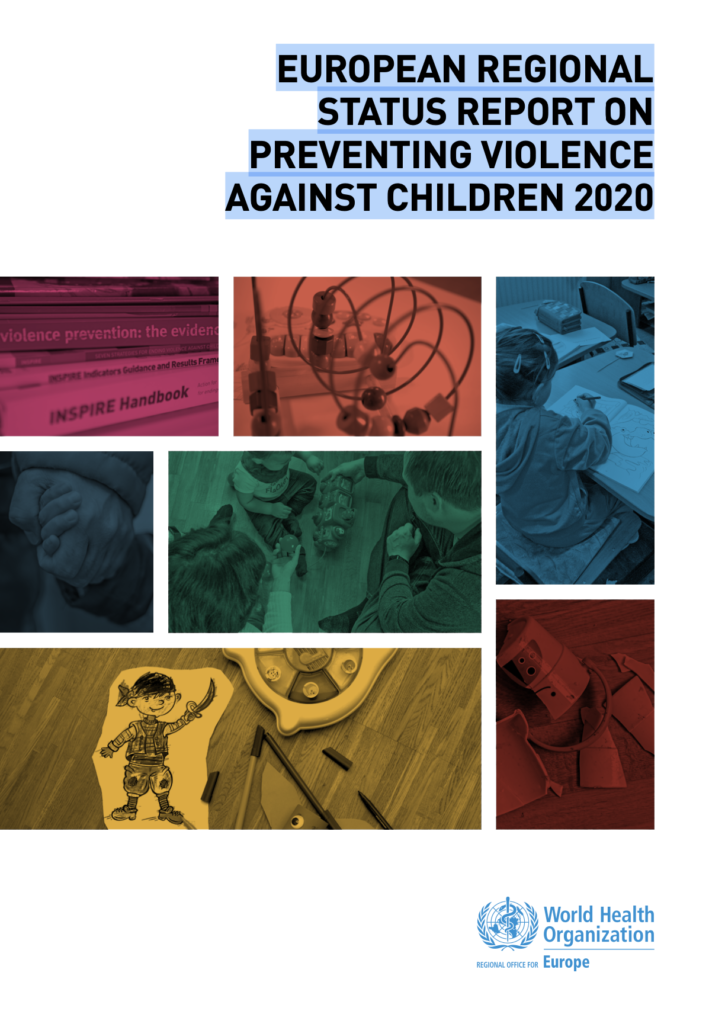The report comprises data gathered from 45 of the 53 European Member States, representing almost 90% of the Region’s 900 million people. Data was gathered regarding implementation of the INSPIRE package by European governments. The INSPIRE package is a blue print of seven strategies for preventing and responding to violence against children in the most cost-effective way. These include:
- I – Implementation and enforcement of laws,
- N – Norms and values,
- S – Safe environments,
- P- Parent and caregiver support,
- I- Income and economic strengthening,
- R – Response and support services, and
- E – Education and life skills.
Violence against children in the European region
Key statistics in the European region reveal it has come far in reducing violence against children. However, efforts still fall short of eliminating violence against children by 2030, the target set by SDG 16.2. through the Agenda 2030 adopted in 2015.
In Europe,
- One in every three children experiences some form of violence in their lifetime.
- 12% of children aged 2–17 years (15.2 million children) experienced violence in the past 12 months.
- In 2017 over 1000 children aged 0–17 years in the Region died due to homicide and assault.
- Based on the most recent available data, homicides of children aged 0–14 years decreased by 13.6% between 2010 and 2015.
- Inequalities persist across the Region. Rates of violence against children are almost twice as high in countries of the Commonwealth of Independent States as in countries of the European Union.
- Nonfatal violence against children ranges from
- 9.6% for sexual abuse (5.7% for boys and 13.4% for girls),
- 22.9% for physical abuse,
- 16.3% for physical neglect,
- 18.4% for emotional neglect, and
- 29.6% for emotional abuse.
- It is estimated that at least 55 million children of the Region have experienced some form of violence in their lifetime.
The COVID-19 pandemic has made matters worse. School closures, lockdowns, physical distancing and their associated mental health consequences for families have put many children at greater risk of violence. During the pandemic mechanisms and opportunities for children to seek help have become more limited.
The way forward
The report states that INSPIRE strategies should be better integrated into existing national frameworks and more widely supported by governments in order to end all forms of violence against children. Examples included in the report are those interventions that reduce risk factors, such as alcohol policies and policies to combat social inequalities.
The report highlights the harm alcohol causes to children. Alcohol is cited as one of the major reasons driving violence against children.
The INSPIRE package includes alcohol policy solutions:
- Laws that protect children from exposure to alcohol is included under “implementation and enforcement of laws”. The report notes that member countries have enacted laws to protect children from exposure to alcohol. However, these laws are lacking in enforcement.
- Support for alcohol use problems of parents or caregivers is included under “parent and caregiver support”. This can reduce the negative effect alcohol poses on children living in households with alcohol problems.
The report further illustrates the vicious cycle of alcohol and violence against children. Research shows that, individuals who face adverse childhood experiences (ACEs) are 4.3 times more likely to develop alcohol problems later in life.
At the 74th World Health Assembly Member States adopted a milestone resolution on scaling up health sector actions for the prevention of and response to violence against children. The European Union countries together with more than 30 other countries co-sponsored this resolution.
The report calls for placing prevention of violence against children at the heart of health, social welfare and other policy platforms.
In our efforts to end violence against children, we are currently at a tipping point. On one side of the scale, we have the heartbreaking situation that 1 in 3 children in the Region experience some form of interpersonal violence during their childhood,” said Dr. Hans Henri P. Kluge, WHO Regional Director for Europe, as per WHO Europe News.
On the other side are our tools and strategies to measure, advocate, prevent and respond to violence, the like of which we have never had before. Sustainable Development Goal (SDG) target 16.2, the INSPIRE technical package and clinical guidelines for health-sector responses together make breaking the cycle of violence all the more achievable.”
Dr. Hans Henri P. Kluge, WHO Regional Director for Europe
